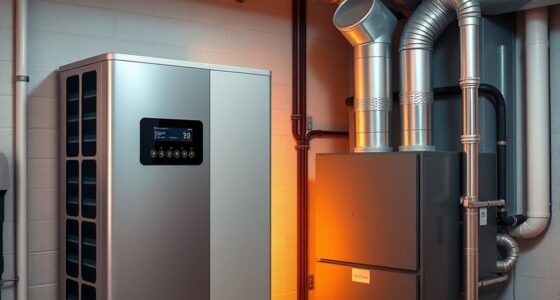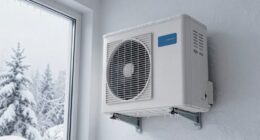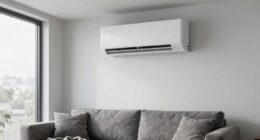Heat pumps are key to managing humidity and creating the perfect indoor environment. They efficiently transfer heat to keep your space cozy in winter and cool in summer, all while regulating humidity levels. By maintaining indoor humidity between 30% and 50%, you enhance comfort and prevent issues like mold growth and structural damage. Heat pumps pull moisture from the air, ensuring a healthier living area and improved air quality. Regular maintenance and smart controls help you maintain these ideal conditions. Discover how these systems can transform your indoor comfort as you explore further.
Key Takeaways
- Heat pumps efficiently regulate indoor humidity levels, maintaining the ideal range of 30% to 50% for optimal comfort and health.
- By removing excess moisture, heat pumps help prevent mold growth, protecting both indoor air quality and structural integrity.
- Advanced humidity control settings in heat pumps allow precise adjustments to ensure year-round comfort, regardless of outdoor conditions.
- Regular maintenance and proper insulation enhance the performance of heat pumps, maximizing their energy efficiency and humidity control capabilities.
- Utilizing heat pumps improves overall air quality by capturing allergens and pollutants while operating without harmful fossil fuels.
Overview of Heat Pumps
Heat pumps are a smart choice for homeowners looking to enhance comfort while saving on energy bills. These energy-efficient systems transfer heat between your home and the outdoors, providing both heating in the winter and cooling in the summer. By extracting heat from outside air during colder months and removing heat from your indoor air during warmer months, heat pumps offer year-round versatility for your comfort.
In addition to their energy efficiency, incorporating ozone air purifiers can complement heat pumps by improving indoor air quality, effectively eliminating allergens and unpleasant odors.
One of the standout features of heat pumps is their efficiency; they can produce up to three times more heating or cooling energy than the electricity they consume, leading to significant energy savings. Many models come with built-in humidity control settings, allowing you to effectively manage moisture levels in your home. This not only helps maintain a comfortable environment but also enhances indoor air quality, creating a healthier living space for you and your family.
Additionally, heat pumps can easily integrate with your existing HVAC system or operate independently, providing flexible installation options that suit various home configurations. With heat pumps, you're investing in a solution that prioritizes both comfort and energy efficiency.
Importance of Humidity Control

Humidity control is essential for your comfort and well-being in your home.
High humidity levels can lead to various issues, including mold growth and structural damage, similar to how toilet maintenance can prevent plumbing problems.
When humidity levels are too high, you risk mold growth and damage to your furniture and structures.
Impact on Comfort Levels
Maintaining ideal indoor humidity levels is essential for your comfort, as it directly affects how you perceive temperature. When humidity levels are too high, even cooler air conditioning can feel stifling, leading to discomfort and potential health risks.
Conversely, low humidity can lead to dry skin and discomfort, highlighting the importance of proper humidity control in enhancing indoor air quality. Striking the right balance between temperature and humidity is vital for creating a pleasant indoor environment.
Here are some key benefits of proper humidity control:
- Enhances comfort by preventing cold, clammy sensations
- Reduces allergens and pollutants, improving air quality
- Helps your home feel cooler at higher temperatures
- Protects against dry skin and chapped lips
- Promotes a more stable indoor environment
The Missouri Department of Energy indicates that a temperature of 75°F feels cooler with humidity levels between 50-55%.
By using heat pumps effectively, you can regulate humidity and temperature to optimize comfort levels. Achieving the right humidity not only makes your space more enjoyable but also contributes to a healthier living environment.
Prevention of Mold Growth
Controlling indoor moisture is essential for preventing mold growth, as high humidity creates an ideal breeding ground for mold spores. To maintain a healthy indoor environment, it's vital to keep humidity levels between 30% and 50%. When humidity exceeds this range, mold can start to grow within just 24 to 48 hours, posing potential health risks and property damage.
Choosing a Home Cleaning Service can also play a role in managing mold, as professional cleaners are equipped to address mold issues effectively.
Heat pumps are effective tools for humidity control, as they remove excess moisture from the air during the cooling process. By ensuring your heat pump is properly maintained and set to ideal levels, you can greatly reduce the likelihood of mold formation.
Additionally, many heat pumps come with advanced filtration systems that help eliminate airborne mold spores and other allergens, further enhancing your indoor air quality.
Investing time in regular maintenance of your heat pump not only helps prevent mold but also contributes to a more comfortable and healthier living space.
Furniture and Structural Integrity
Consistently managing indoor humidity is essential for protecting your furniture and the structural integrity of your home. When you maintain ideal humidity levels between 30% and 50%, you prevent wooden furniture from warping and cracking, which guarantees their longevity.
A well-designed space, enhanced by modern farmhouse decor trends, can also contribute to better humidity control through the use of natural materials that promote a healthier environment. High humidity can lead to mold growth, damaging both your furniture and compromising your home's structural integrity by weakening walls and ceilings.
On the other hand, low humidity can cause your wooden floors and furniture to shrink, leading to gaps and potential structural issues over time.
To keep your home in great shape, consider these key points:
- Prevent warping and cracking of wooden furniture.
- Avoid mold growth that damages both furniture and structure.
- Maintain the aesthetic appeal of your living space.
- Reduce the risk of costly repairs from moisture damage.
- Create a healthier living environment for you and your family.
Mechanisms of Humidity Regulation

Heat pumps play an essential role in regulating indoor humidity by efficiently removing moisture from the air. When you run your heat pump in cooling mode, it draws warm, humid air over evaporator coils. This process condenses moisture, which is then expelled through a condensate line.
Identifying local regulations is also important when considering systems like heat pumps, as they can impact installation and efficiency. Advanced models, like Carrier's Infinity® Series, come equipped with humidity control features that allow precise adjustments to maintain ideal indoor humidity levels, ensuring your comfort.
In the summer, heat pumps function similarly to air conditioners, effectively lowering humidity while cooling the air. This dual function not only enhances your comfort but also helps prevent mold growth, promoting better indoor air quality.
The Performance™ Series of heat pumps utilizes two-stage compression, improving humidity control by managing both temperature and moisture levels simultaneously.
To maximize these humidity regulation capabilities, regular maintenance and ideal settings are essential. By ensuring your heat pump operates efficiently, you can achieve energy efficiency while maintaining a comfortable and healthy indoor environment year-round.
Always pay attention to your system's performance to get the most out of its humidity control features.
Benefits of Heat Pumps

Effective humidity regulation is just one of the many advantages of using heat pumps in your home. These systems not only enhance indoor comfort but also make your living space healthier.
By maintaining ideal humidity levels between 30% and 50%, heat pumps help prevent mold growth and improve overall air quality. Additionally, proper humidity control is essential in preventing health issues, such as those related to gout management insights.
You'll appreciate how they work efficiently—providing up to three times more heating or cooling output than the energy they consume.
Here are some key benefits of heat pumps:
- Energy efficiency: They save on energy bills while maintaining comfort.
- Versatile operation: Heat pumps cool like air conditioners in summer, removing excess moisture.
- Advanced control: Many models have humidity control settings that adjust automatically.
- Year-round comfort: Heat pumps guarantee your home feels pleasant in all seasons.
- Improved performance: Combining heat pumps with insulation boosts energy efficiency and humidity control.
Effects of Humidity on Comfort

Humidity can make or break your comfort at home. High humidity levels can leave you feeling clammy and uncomfortable, even when temperatures are cool. You might not realize it, but maintaining indoor humidity between 30% and 50% is vital for your overall comfort. This range helps prevent dry skin, respiratory issues, and the mold growth associated with excessive humidity.
Here's a quick look at how different humidity levels impact your comfort:
| Humidity Level | Comfort Level |
|---|---|
| Below 30% | Dry skin, discomfort |
| 30% – 50% | Ideal comfort |
| Above 50% | Clammy, uncomfortable |
When humidity is too high, your body's natural cooling process through evaporation slows down, making you feel warmer than it is. Studies show that at 75°F with 50-55% relative humidity, you'll perceive the temperature as cooler, enhancing your comfort. Proper humidity control not only keeps you feeling good but also protects your furniture and home from damage. So, managing humidity is essential for a healthy, comfortable indoor environment.
Maintenance Tips for Heat Pumps

Proper maintenance is vital for keeping your heat pump running efficiently and effectively.
Regular upkeep not only enhances humidity control but also improves energy efficiency, which is key in maintaining a comfortable indoor environment during various weather conditions.
By following these maintenance tips, you can enhance humidity control, improve energy efficiency, and guarantee a comfortable indoor environment:
- Clean or replace air filters every 1-3 months to maintain ideal airflow and prevent humidity buildup. This is similar to how pool maintenance equipment promotes cleanliness and hygiene in your pool.
- Schedule annual professional maintenance to check that your heat pump operates at peak performance, catching any potential issues early.
- Keep the outdoor unit clear of debris and vegetation, facilitating proper airflow essential for effective moisture removal from indoor air.
- Monitor indoor humidity levels with a hygrometer, aiming to maintain levels between 30% and 50%. Adjust your heat pump settings or use dehumidifiers as needed.
- Utilize programmable thermostats to automate humidity management, allowing your heat pump to run during peak humidity times without wasting energy.
Enhancing Indoor Air Quality

When it comes to creating a healthier home environment, heat pumps play an essential role by regulating temperature and maintaining ideal humidity levels. By keeping humidity between 30% and 50%, heat pumps prevent mold growth and enhance overall comfort. This humidity control directly impacts indoor air quality (IAQ), making your living space healthier.
Additionally, incorporating plants like the String of Hearts can further improve air quality, as they naturally help to filter indoor air pollutants and enhance aesthetics with their unique appearance best soil for String of Hearts.
Advanced filtration systems in heat pumps capture pollutants like dust, pollen, and mold spores, which can otherwise compromise your indoor air quality. Regular maintenance guarantees your heat pump operates efficiently, improving air filtration and reducing humidity levels that may lead to respiratory issues.
With improved air circulation, heat pumps contribute to a fresher indoor environment, greatly boosting comfort levels and promoting health benefits for you and your family.
Plus, since heat pumps operate without fossil fuels, they reduce harmful emissions, further enhancing indoor air quality.
Investing in an energy-efficient heat pump not only improves your home's comfort but also fosters a healthier living space. By prioritizing humidity control and maintaining proper air filtration, you can enjoy a cleaner, more breathable indoor environment.
Frequently Asked Questions
Do Heat Pumps Improve Indoor Air Quality?
Yes, heat pumps do improve indoor air quality. They regulate temperature and humidity, filter out pollutants, and promote better air circulation, creating a healthier environment. Regular maintenance guarantees they perform efficiently for maximum air quality.
Can a Heat Pump Control Humidity?
Yes, a heat pump can control humidity. It effectively removes excess moisture from indoor air, helping you maintain a comfortable environment. By managing humidity levels, it reduces the risk of mold and improves overall air quality.
Can I Use My Heat Pump as a Dehumidifier?
Yes, you can use your heat pump as a dehumidifier. When set to cooling mode, it effectively removes moisture from the air, helping maintain comfortable humidity levels and improving your indoor air quality.
Does a Heat Pump Act as a Humidifier?
A heat pump doesn't act as a humidifier. Instead, it removes excess moisture from the air during cooling. If you're looking to manage humidity, focus on its dehumidification capabilities for maximum comfort.
Conclusion
In conclusion, savvy homeowners can greatly enhance their indoor environments by embracing heat pumps for humidity control. By skillfully regulating moisture levels, you'll create a cozy, comfortable space that promotes well-being. Remember, proper maintenance is key to keeping your heat pump humming happily. So, take charge of your climate, and enjoy the delightful dance of temperature and humidity that transforms your home into a haven of health and harmony!









